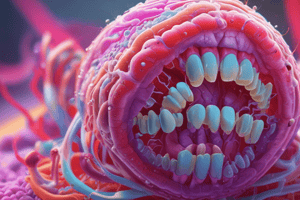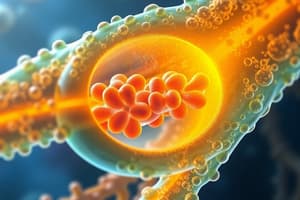Podcast
Questions and Answers
Robert Hooke, in 1665, first observed ______ in cork and coined the term 'cell'.
Robert Hooke, in 1665, first observed ______ in cork and coined the term 'cell'.
cells
The 19th century marked a period of significant advancement in the understanding of ______ and cellular structures.
The 19th century marked a period of significant advancement in the understanding of ______ and cellular structures.
cells
Matthias Schleiden and Theodor Schwann proposed the ______ theory, which stated that all living organisms are composed of cells.
Matthias Schleiden and Theodor Schwann proposed the ______ theory, which stated that all living organisms are composed of cells.
cell
Eduard Buchner discovered ______ and demonstrated that they could catalyze reactions outside living cells.
Eduard Buchner discovered ______ and demonstrated that they could catalyze reactions outside living cells.
S.J.Singer and G.L.Nicolson formulated the ______ mosaic model in 1972.
S.J.Singer and G.L.Nicolson formulated the ______ mosaic model in 1972.
Antonie van Leeuwenhoek made detailed observations of ______-celled organisms and bacteria.
Antonie van Leeuwenhoek made detailed observations of ______-celled organisms and bacteria.
The earliest recorded observations related to biological membranes can be traced back to the ______ and 18th centuries.
The earliest recorded observations related to biological membranes can be traced back to the ______ and 18th centuries.
Leeuwenhoek, using improved microscopes, made detailed observations of ______ organisms and bacteria.
Leeuwenhoek, using improved microscopes, made detailed observations of ______ organisms and bacteria.
The 19th century marked a period of significant advancement in the understanding of cells and ______ structures.
The 19th century marked a period of significant advancement in the understanding of cells and ______ structures.
With the development of biochemical techniques, scientists began to investigate the chemical composition of cells and their ______.
With the development of biochemical techniques, scientists began to investigate the chemical composition of cells and their ______.
In 1895, Eduard Buchner discovered that enzymes could catalyze reactions ______ living cells.
In 1895, Eduard Buchner discovered that enzymes could catalyze reactions ______ living cells.
The formulation of the ______ mosaic model by S.J.Singer and G.L.Nicolson in 1972 was a significant milestone in the history of biological membranes.
The formulation of the ______ mosaic model by S.J.Singer and G.L.Nicolson in 1972 was a significant milestone in the history of biological membranes.
Flashcards are hidden until you start studying




